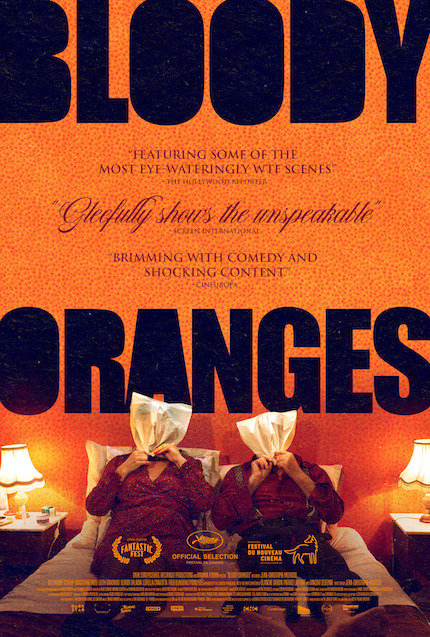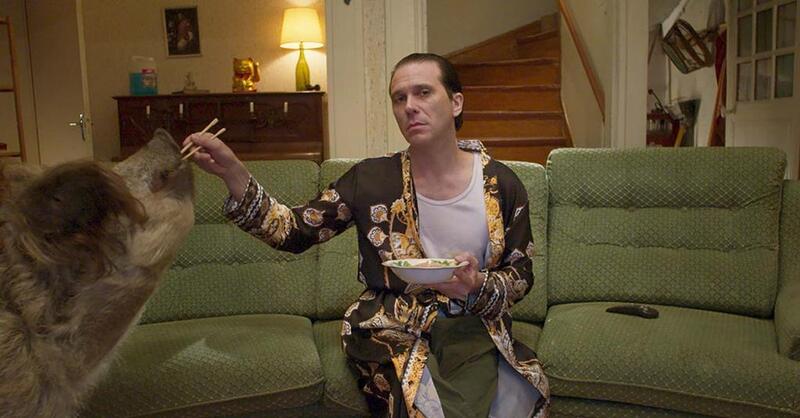Review: BLOODY ORANGES, Amorals, Comedy, Politics
Denis Podalydès, Christophe Paou, and Guilaine Londez star in a comedy from France, directed by Jean-Christophe Meurisse.

The French theatre director Jean-Christophe Meurisse turned heads in 2016 when his feature debut Apnée premiered in the Cannes' Critics Week.
An eccentric comedy, carving Dadaistic moments from a mix of mundane and infantile, propelled Meurisse right away into the company of French absurdist prankers of the Quentin Dupieux rank. Apnée's quirkiness and delightful playfulness riffed off political topics satirically without being (too) abrasive.
This year, the French director returns to La Croisette with his sophomore feature film, Bloody Oranges, which bowed in the Midnight Screenings sidebar. Meurisse adjusts the tone for the follow-up, shifting gears from playfully nonsensical to nonsensically savage. Bloody Oranges keeps the appearance of a dark social satire; however, the film draws heavily from reality and the degree of plausibility undermines the notion of hyperbole in the process. Meurisse said that a case from the U.S., when a young girl avenged herself being abused by making the rapist eat his testicles, inspired the script.
Apnée follows a threesome of inseparable friends frolicking in a series of sketch-like vignettes. Bloody Oranges' structure is also based on a decentralized storyline following four separate narrative strands. A retired couple is drowning in debts and tries to dance their way out of losing a house, a minister of the economy who is suspected of tax evasion attempts to bring more money into the state budget by raising taxes and knocks on a wrong door one night, a teenage girl gets abducted and abused after she has just properly experienced her burgeoning sexuality, and a lawyer has to deal with his parents who he considers to be careless and finds himself on the receiving end of road rage.
Meurisse and his writing partners Amélie Phillipe and Yohann Gloaguen set the scenes in all four storylines by overstretching the exposition and squeezing comic juice out of it. An awkward gyno exam launches the teenage girl storyline, a scene that leans more towards Meurisse's previous effort. A sudden and clean-cut turns the cringe comedy inwards, taking a dark and shocking turn, and dialing up cynicism. Bloody Oranges become a no-holds-barred pitch-black satire. The film harnesses the shock of violence, leaving little space for imagination to enhance the delivery of the political context that is hard to overlook.
Many films came out of 2020 bearing the brand of the pandemic, either as chamber pieces shot under the strict lockdown regulations or directly/indirectly referencing the virus. Although Bloody Oranges does not bear the mark in such a prominent manner, the film vents a hefty dose of frustration across generations and class. The common denominator in all four storylines -- injustice -- becomes the film leitmotif, along with anxiety and misery.
Moreover, inspired by the story of an abusee torturing her abuser, Meurisse engineered twists of perverse cosmic irony, upending the injustice that has been acted upon the characters. The chain reaction does not leave any winners behind; every character emerges damaged -- physically, morally, or emotionally -- in a cursed circle of transgressions. Meurisse takes the New French Burlesque to a dark place with the Grand Guignol treatment.
The director leads Bloody Oranges with such a degree of cynicism that the film reaches the vicinity of extreme cinema. However, Meurisse does not fully leave behind the off-kilter and quirky brand comedy of Apnée, although it is re-deployed for perverted and sadistic purposes. The actor Frédéric Blin embodies the style, blending the quirky and perverted in his depiction of the character credited as a madman (the rapist), who is portrayed as a parody of serial killers.
Bloody Oranges is a fairly cynical and anarchistic satire, a comedy of (a)morals touching political topics in the disenfranchised and embittered French society.
Review previously published in July 2021 as part of our coverage of the Cannes Film Festival. The film releases Wednesday, April 20, on various Video On Demand platforms.
NOTE: the trailer below is NSFW.









